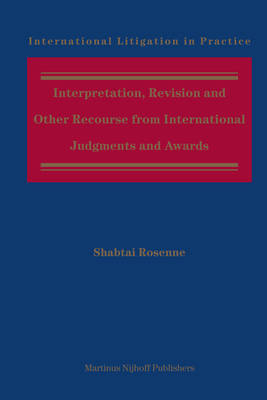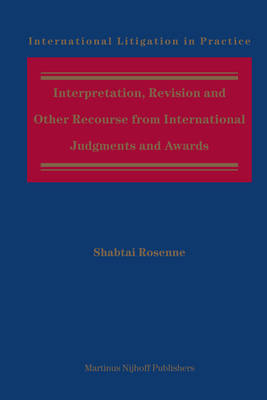
- Afhalen na 1 uur in een winkel met voorraad
- Gratis thuislevering in België vanaf € 30
- Ruim aanbod met 7 miljoen producten
- Afhalen na 1 uur in een winkel met voorraad
- Gratis thuislevering in België vanaf € 30
- Ruim aanbod met 7 miljoen producten
Zoeken
Interpretation, Revision and Other Recourse from International Judgments and Awards
Shabtai Rosenne
€ 256,45
+ 512 punten
Omschrijving
Although there had been a few cases of the interpretation of judgments of the Permanent Court of International Justice and the International Court of Justice, it was not until the mid-1980s that serious judicial discussion of the related problems of the interpretation and revision by the International Court of one of its own judgments came before the Court. Similar cases have also arisen in international arbitration proceedings between States.
Interpretation, revision, and other forms of 'reference' to the International Court from some other international body, court or arbitral tribunal have produced a complex pattern of black letter texts supplemented by an even more complex set of judge made rules and practices. The close tie between the final decision and the highly political context of the obligation to comply with it produces a continuing tension between the finality of the decision and any one of the possible references in recourse from it. If any tendency can be discerned from the relevant materials it is in the strong preference for maintaining the integrity and the authority of the res judicata, provided that no obvious miscarriage of justice is engendered. Interpretation is preferable to revision.
This book is the first in the series International Litigation in Practice. The series will consist of short, concise, practical booklets to be of use for practitioners pleading before international courts and tribunals, and everyone else involved and / or interested in the activities of these courts.
Interpretation, revision, and other forms of 'reference' to the International Court from some other international body, court or arbitral tribunal have produced a complex pattern of black letter texts supplemented by an even more complex set of judge made rules and practices. The close tie between the final decision and the highly political context of the obligation to comply with it produces a continuing tension between the finality of the decision and any one of the possible references in recourse from it. If any tendency can be discerned from the relevant materials it is in the strong preference for maintaining the integrity and the authority of the res judicata, provided that no obvious miscarriage of justice is engendered. Interpretation is preferable to revision.
This book is the first in the series International Litigation in Practice. The series will consist of short, concise, practical booklets to be of use for practitioners pleading before international courts and tribunals, and everyone else involved and / or interested in the activities of these courts.
Specificaties
Betrokkenen
- Auteur(s):
- Uitgeverij:
Inhoud
- Aantal bladzijden:
- 200
- Taal:
- Engels
- Reeks:
- Reeksnummer:
- nr. 1
Eigenschappen
- Productcode (EAN):
- 9789004157279
- Verschijningsdatum:
- 13/08/2007
- Uitvoering:
- Hardcover
- Formaat:
- Genaaid
- Afmetingen:
- 165 mm x 244 mm
- Gewicht:
- 544 g

Alleen bij Standaard Boekhandel
+ 512 punten op je klantenkaart van Standaard Boekhandel
Beoordelingen
We publiceren alleen reviews die voldoen aan de voorwaarden voor reviews. Bekijk onze voorwaarden voor reviews.








